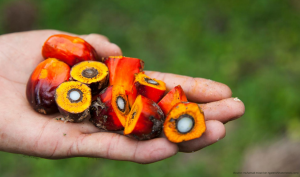Published on: February 20, 2019

This is the first article in a four-part series designed to demystify the complex topic of palm oil and help individuals separate fact from fiction, to make choices that are good for people and the planet. Natural Habitat’s Sustainability & Corporate Communications Director Monique van Wijnbergen is a company spokesperson for Palm Done Right, an international campaign to raise awareness around the positive ripple effects that happen when palm oil is grown for good.
The first step to understanding the topic of palm oil is to explore two common misconceptions that have gained attention recently due to media attention and false claims.
This is simply not true. There is as much false information out there as there are great solutions ready to be told. This misconception is voiced by a featured article in the newspaper The Independent, which stated that “there is no such thing as sustainable palm oil”, which only talks about palm growing in Southeast Asia. Latin America, a growing palm-producing frontier with a very different growth mindset, was not included in the research.
The research pinpoints some shortcomings around certification standards, like consensus over what counts as deforestation, the use of sufficiently strict guidelines for forest protection, and lax enforcement. It does not dig into some of the great solutions that are happening in Latin America, like in Colombia, where producers signed the first national zero-deforestation agreement for palm oil. Or in Ecuador, where the Ministry of Agriculture reactivated its jurisdictional Round Table on Sustainable Palm Oil (RSPO) Certification plan, which means entire provinces will be certified sustainable, instead of individual companies and plantations.
When companies (and countries) don’t compromise, sustainable palm oil is a reality. This means taking the challenges facing palm oil seriously: eradicating the use of chemicals by using 100% organic practices, refraining from deforestation, taking a wildlife friendly approach to oil palm growing, and taking a fair and social approach to farmers and workers.
Built into our mission is our responsibility to do palm right. Our dedicated Ecuadorian farmers are proving every day that palm oil can be produced sustainably, through the strict adherence to organic and sustainable production practices. Our Palm Done Right Model serves as a foundation to govern our palm operations in the spirit of Palm Done Right. It sets our standard for organic production, empowerment and collaboration. We believe that these three parts are essential components of any operation and need to be provided together. Without empowerment of farmers and workers, organic agriculture will not bring maximum benefits to yields, livelihoods, soil and ecosystems. Without supply chain collaboration, organic production will not receive the market reward, investment and scale, crucial to its viability. And without innovating organic production, we will not succeed to bring quality, health and sustainability solutions to our farmers, customers and partners.
To make and keep sustainable palm oil a reality we need to continually seek out innovative research and partners that can help us further our mission for our farmers, workers, markets and our planet.
Ask anyone, in a grocery store, in the street, or in a café, and people will testify that global deforestation is linked to palm oil. They would even argue that boycotting palm oil would be a solution to halt deforestation. This is also not true.
While it is true that palm oil production, especially in Southeast Asia, has been the cause of much environmental destruction, numerous reports have shown that far larger deforestation has occurred from livestock, beef production, and soy-farming. In fact, soy farming is responsible for more than double the amount of deforestation than palm oil production. In the context of other food sources, livestock and beef production has led to more than five times the amount of deforestation, compared to palm oil (see phys.org).
Replacing palm oil with other ingredients such as soy or butter would not solve the issue of deforestation but would worsen it. Palm oil is the most productive vegetable oil crop. Alternative vegetable oils aren’t better, in fact, palm oil produces at least six times more oil per hectare than its closest rivals, rapeseed, and soy. Because land is one of the most limited resources on our overcrowded planet, switching to an oil crop that takes up so much more land is likely to cause even greater environmental damage.
It is important to educate the general public to look for sustainable sources of palm oil, such as palm oil made using 100% organic practices. The attention needs to shift to showcasing the great solutions that are already out there, for example from Latin America.
Stay tuned for our next post where we will further explore the topic of deforestation and why organic crops are the better choice for our planet.
Written by Monique van Wijnbergen, Natural Habitat’s Sustainability & Corporate Communications Director and spokesperson for Palm Done Right and released in New Hope Network.
Palm can be grown for good, bringing benefits to:
Together, we can influence change for: